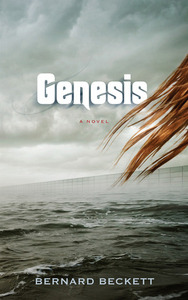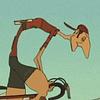Take a photo of a barcode or cover
A fun little read, and once more a book that makes me wish I was still teaching philosophy so I could use it in class. The only thing keeping it from 4-stars is that I saw the twist coming about halfway through the book, and I don't feel like the author closed the loop on the philosophical issues raised. Essentially the book winds up being just a more detailed version of the "Chinese Room" thought experiment, which is even covered in the last part of the book. But no new ground is broken after the thought experiment is described.
I loved the philosophy around Artificial Intelligence in this but I do wish there'd been a bit more of a plot
This novella would have worked as either a short story or a novel, but this manifestation was not a success. The premise was interesting, but the exploration of the main themes was superficial and juvenile. After finishing, I felt as though I'd seen more interesting, thoughtful episodes of "Twilight Zone."
I enjoyed the ideas put forth in this novel more than the execution. The structure read as mostly exposition. I found the format, an interrogation of a potential student for a place in "The Academy", to be a bit irritating, though the payoff at the end made it a bit less so.
Set in 2075, this novel follows the four-hour entrance examination of a prospective student to the prestigious Academy. Anax has chosen to be tested on her knowledge of a historical figure who was imprisoned for defying the rules of the isolated Republic where he was born by allowing a stranger with potentially harmful germs to come ashore on the island.
Reading almost like a play, the narrative is take up with the examiner's questions and Anax's responses, interspersed with her short breaks each hour. The book is an exercise in rhetoric, philosophical and introspective in tone.
The plot is unique and the writing is very good, but the story itself a bit dry and slow. The author withholds key information from the reader that is revealed in a surprise twist ending, frustrating for readers who prefer to figure things out on their own.
Reading almost like a play, the narrative is take up with the examiner's questions and Anax's responses, interspersed with her short breaks each hour. The book is an exercise in rhetoric, philosophical and introspective in tone.
The plot is unique and the writing is very good, but the story itself a bit dry and slow. The author withholds key information from the reader that is revealed in a surprise twist ending, frustrating for readers who prefer to figure things out on their own.
Post-apocalyptic meditation on philosophy and the nature of historical evidence, disguised as a young adult science fiction novel.
Beckett has written a very different young adult novel, exhibiting a kind of purity unusual in most young adult fiction, deep and complex under the guise of its ostensible simplicity. Although I never truly connected with any characters from the story and there are, in fact, times when Genesis feels a bit like witnessing a philosophical diatribe, this also gave Beckett the opportunity to present his ideas with admirable economy. "Human spirit," he says, "is the ability to face the uncertainty of the future with curiosity and optimism." It's this spirit which we discard at our great peril. Fear is the killer of our species, he argues, allowing us to be easily manipulated by our leaders and by each other. And yeah, I did not see it coming...
My high school U.S. history and economics teacher had this cardboard cutout of a monkey that said something like, “ARE YOU THE HUNDREDTH MONKEY?” The monkey was looking very Uncle Sam in his pose, so it felt imperative that you either be or not be the hundredth monkey. So, there was a kind of underground movement in the class to find out what the hell that meant. It turned out that the teacher would tell you eventually if you pestered him enough about it. The cutout was based on the book [b:The Hundredth Monkey|252067|The Hundredth Monkey|Ken Keyes Jr.|http://ecx.images-amazon.com/images/I/31kwJ%2BdpGgL._SL75_.jpg|244253] – shut up, we didn’t have google then, so we had to do a lot more hard-hitting investigation to learn random stuff. In college, I found the Hundredth Monkey book at Goodwill for $2, so I had to buy it. It is about some monkeys eating coconuts on a beach from what I remember. One of them figures out how to eat them without getting mouthfuls of sand and then they all start eating coconuts with no sand.
So, that’s what this book is about, too. But, then, in this book the other monkeys kill the one that doesn’t want to eat sand. There’s also some stuff about the Bible and Rome, but that's mostly a red herring, I think.
So, that’s what this book is about, too. But, then, in this book the other monkeys kill the one that doesn’t want to eat sand. There’s also some stuff about the Bible and Rome, but that's mostly a red herring, I think.
I usually detest "philosophical" books because the write either is a moron himself or assumes the reader is--therefore dumbing the content down to the point that it is drivel. The Alchemist, cough, cough. This book was not that way--you get to draw your own conclusions and the writer trusts you to do so. A recommended read.








